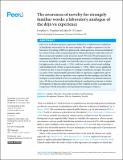The awareness of novelty for strangely familiar words : a laboratory analogue of the déjà vu experience
Date
11/11/2014Metadata
Show full item recordAbstract
Déjà vu is a nebulous memory experience defined by a clash between evaluations of familiarity and novelty for the same stimulus. We sought to generate it in the laboratory by pairing a DRM recognition task, which generates erroneous familiarity for critical words, with a monitoring task by which participants realise that some of these erroneously familiar words are in fact novel. We tested 30 participants in an experiment in which we varied both participant awareness of stimulus novelty and erroneous familiarity strength. We found that déjà vu reports were most frequent for high novelty critical words (~25%), with low novelty critical words yielding only baseline levels of déjà vu report frequency (~10%). There was no significant variation in déjà vu report frequency according to familiarity strength. Discursive accounts of the experimentally-generated déjà vu experience suggest that aspects of the naturalistic déjà vu experience were captured by this analogue, but that the analogue was also limited in its focus and prone to influence by demand characteristics. We discuss theoretical and methodological considerations relevant to further development of this procedure and propose that verifiable novelty is an important component of both naturalistic and experimental analogues of déjà vu.
Citation
Urquhart , J & O'Connor , A R 2014 , ' The awareness of novelty for strangely familiar words : a laboratory analogue of the déjà vu experience ' , PeerJ . https://doi.org/10.7717/peerj.666
Publication
PeerJ
Status
Peer reviewed
ISSN
2167-8359Type
Journal article
Description
Akira O’Connor is supported by a SINAPSE (Scottish Imaging Network: A Platform for Scientific Excellence) fellowship. Josephine Urquhart was supported by the University of St Andrews URIP Scheme.Collections
Items in the St Andrews Research Repository are protected by copyright, with all rights reserved, unless otherwise indicated.

